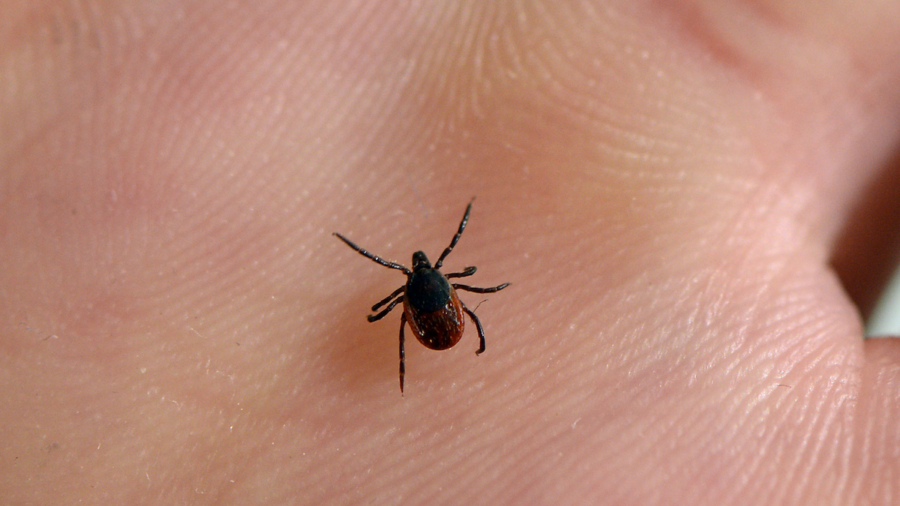Doctors confirmed that a Maine resident contracted a rare tick-borne illness that can cause memory loss, brain infection, and even death.
The Maine Centers for Disease Control and Prevention said in a health advisory this week that the case shows that people could potentially contract Powassan encephalitis in the state.
Clinicians should “consider testing for Powassan in patients presenting with unexplained encephalitis, meningitis, or high fever (100.4F or 38C) during the summer and early fall,” it stated.
The agency was alerted that a Maine resident went to the hospital with symptoms last month and doctors later confirmed the person contracted Powassan.
“Powassan virus is transmitted to humans through the bite of an infected Ixodes tick. Signs and symptoms can include fever, headache, vomiting, weakness, confusion, seizures, and memory loss. Long-term neurological problems may occur. Symptoms can begin anytime from one week to one month after the tick bite. There is no specific treatment, but people with severe Powassan virus illness often need to be hospitalized,” the agency stated.
According to the Portland Press Herald, every year Maine has more than 1,000 cases of Lyme disease, the infamous disease spread by ticks. The Powassan case is the first in the state since 2017, when two people contracted the virus and eventually made full recoveries.
“Powassan, although rare, can be serious, so it is important to be aware of your surroundings and take steps to avoid being bitten by ticks. Use caution in wooded and bushy areas and follow the No Ticks 4 ME approach to help reduce exposure to ticks and lower the risk of disease,” Maine CDC Director Nirav Shah told WMTW. There have been 11 cases in Maine since 2000.
Case of rare tick-borne virus confirmed in Maine https://t.co/PfxyOhdOQD pic.twitter.com/jppKVxynq1
— WMTW TV (@WMTWTV) July 24, 2019
Rare but Severe
According to the national Centers for Disease Control and Prevention (CDC), the Powassan virus disease is rare but severe and is spread by infected ticks.
“Powassan virus belongs to a group of viruses that can cause infection of the brain (encephalitis) or the membranes around the brain and spinal cord (meningitis),” it stated.
Most cases in the United States have occurred in the northeast and around the Great Lakes in the spring, summer, or fall when ticks are most active.
“Anyone bitten by a tick in an area where the virus is commonly found can be infected with Powassan virus. The risk is highest for people who live, work, or recreate in brushy or wooded areas, because of greater exposure to potentially infected ticks,” according to the CDC.
In severe cases, Powassan causes confusion, loss of coordination, difficulty speaking, and seizures.
CDC confirms case of Powassan virus in Maine: https://t.co/OOMDGCIGY2 pic.twitter.com/zQZlWDKOV1
— CBS 13 News (@WGME) July 24, 2019
Diagnoses are made by doctors analyzing signs and symptoms and looking for a history of possible exposure to ticks infected with the disease. Lab testing of blood or spinal fluid can confirm a diagnosis.
“There are no specific medicines to treat Powassan virus disease. People with severe disease often need to be hospitalized to receive support for breathing, staying hydrated, and reducing swelling in the brain,” the CDC advised.
According to a study published in 2017, the number of Powassan cases in the United States has increased considerably.
“With a total number of 27 cases from 1958 to 1998 and 98 cases from 1999 to 2016, reported cases have increased by 671 percent over the last 18 years,” researchers said, calling the disease “an emerging danger worldwide.”
According to the team, the fatality rate is 10 percent. The fatality rate is about 50 percent for people who develop neurological symptoms.
Comparing it to the better known Lyme disease, the researchers added: “With the large number of cases, pathognomonic findings, and insidious onset of symptoms, Lyme is readily being identified and treated. Powassan, on the other hand, poses a greater uncertainty due to its rapid onset of neuro-invasive symptoms, the brief transmission time, and less reliable serologic testing.”


